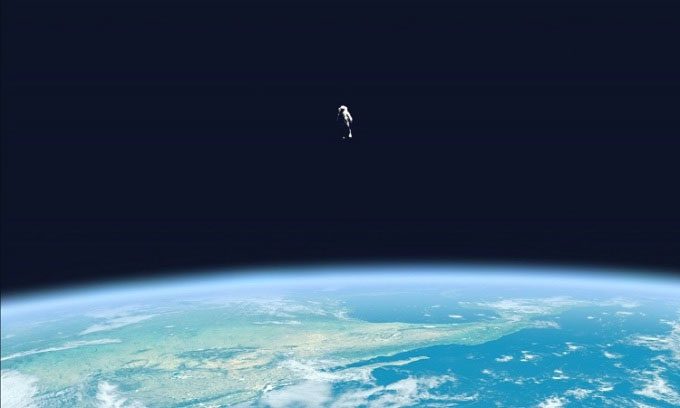The human body undergoes various transformations under the influence of the vacuum environment before it ultimately disintegrates in space.
Imagine you are ejected from a space station for some reason without an astronaut suit or oxygen tank. You find yourself alone in the vacuum of space. At this point, you must act quickly. You won’t need to worry about freezing to death. Generally, the space environment is extremely cold, around -270 degrees Celsius due to cosmic microwave background radiation. However, the human body loses heat very poorly, especially in the vacuum of space. There are three methods for heat transfer from the warm body to the surrounding environment: convection, conduction, and radiation.

The human body can take billions of years to completely disintegrate in the vacuum of space. (Photo: Synthex).
- Convection is the movement of fluid, such as warm air rising.
- Conduction is the transmission of heat through direct contact, as when you accidentally touch a hot stove.
- Radiation is the process of transferring energy in the form of electromagnetic waves.
Since there is no air or water surrounding your body, there is no way to transfer heat through convection and conduction, and you can only rely on radiation. The human body typically emits about 100 watts of infrared radiation (equivalent to the energy level of an old light bulb). Therefore, it takes several hours for the internal temperature of the body to drop below freezing.
However, the coldness and vacuum of space will affect you in other ways much faster. First, any oil or moisture on your skin will quickly evaporate in the vacuum, leading to unpleasant frostbite. Despite being surrounded by a vacuum, you will not explode. The skin layer helps keep your body intact, so your blood will not boil, and your eyes will not pop out. Instead, you will experience a rare phenomenon called ebullism.
Ebullism occurs when the surface of the skin is exposed to a vacuum. The lower pressure outside the body causes the fluids within the skin to expand, making you swell. Researchers do not have much empirical evidence regarding the full effects of ebullism, but in several instances of accidental vacuum exposure, individuals have doubled in size. However, you could still survive if you return to a pressurized environment within a few minutes.
At the moment you leave the airlock of the space station, you might want to hold your breath to extend your survival time, similar to diving underwater. This is an extremely bad idea. The problem is that your body (especially your lungs, throat, and upper respiratory tract) cannot hold a large gulp of air in a vacuum. Despite your efforts to hold your breath, all the air in your lungs will escape. If you try to hold it in, it will release in a particularly violent and sudden manner, causing irreparable damage.
This is the fundamental issue that will lead to your demise. In space, there is no air to breathe. But your brain doesn’t know that, at least not the part of the brain that is not under your conscious control. Your heart continues to pump blood. Your circulatory system keeps functioning. However, your lungs are empty.
Your blood, which carries little oxygen, reaches your lungs, ready to take in fresh air and circulate throughout your body. Very soon, the oxygen saturation level in your blood decreases throughout your body. Recognizing the absence of this essential oxygen source, your body immediately goes into alarm mode. To preserve the most vital functions and maintain oxygen levels as much as possible, your body will shut down the part that consumes the most oxygen: the brain.
Depending on your physical condition, you will have about 6 to 12 seconds before losing consciousness and completely fainting. That’s all the time you have to control and protect your body. After that, you may be rescued by someone and restored to a relatively normal state after receiving treatment for frostbite and the unknown side effects of ebullism.
Ultimately, due to lack of oxygen, important organs will sequentially shut down. After a few minutes, you will suffer organ failure and die. What happens next depends on your location in space. If you are in Earth’s orbit, you will not freeze. Even in that orbit, the Sun, which is 150 million kilometers away, emits enough radiation to keep your body warm for centuries. Without a planetary atmosphere or a protective spacecraft shell, you will be exposed to harmful ultraviolet radiation from the Sun, causing your skin to gradually burn. If you are in the vacuum beyond Earth’s orbit or the shadow of another celestial body, your body will gradually cool down. Eventually, your body temperature will balance with the frigid surrounding environment.
With a frozen body covered in ice crystals, you will drift aimlessly among the planets. Unless you are fortunate enough to enter a special orbit, you will never collide with anything larger than a micrometeoroid for billions of years. However, these micrometeoroids can still cause damage, and your body will accumulate numerous small dents from countless impacts, eventually disintegrating as organic molecules disperse and blend into larger dust clouds.





















































